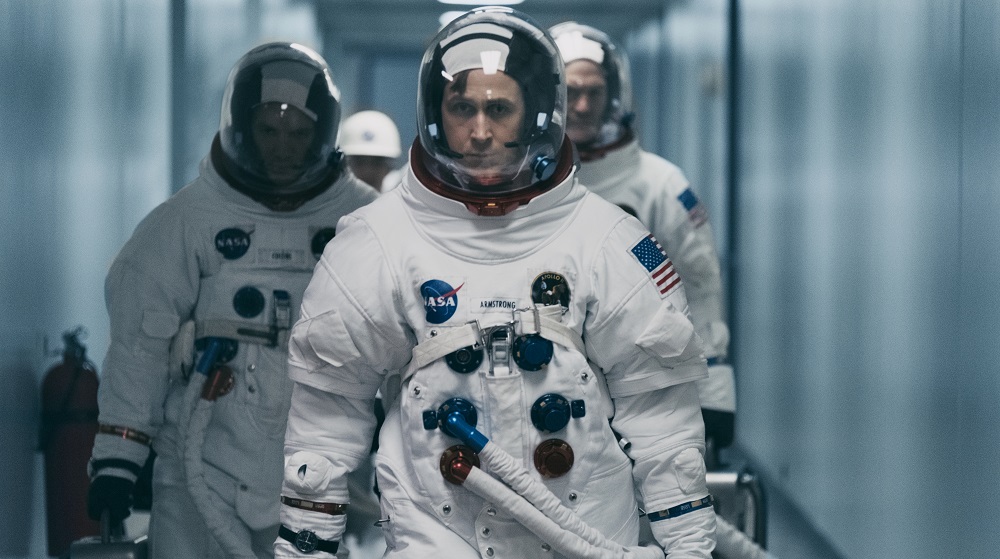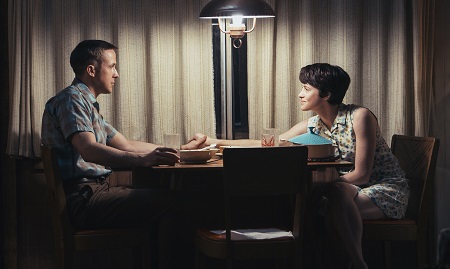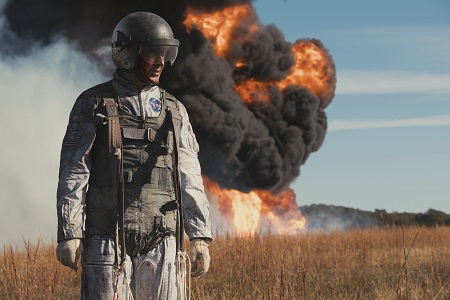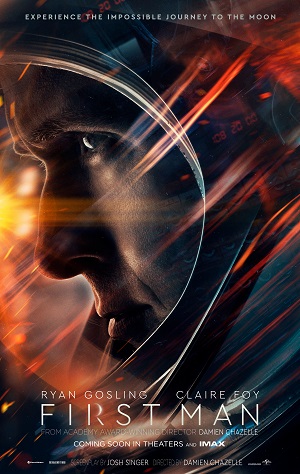
Rousing First Man Achieves Emotional Liftoff
Long before Neil Armstrong (Ryan Gosling) became the commander of the Apollo 11 and landed on the surface of the Moon, the astronaut would have to endure a series of personal and professional trails where failure, success, tragedy and good fortune would all travel in uneasy hand-and-hand. He and his wife Janet (Claire Foy) would have to endure the death of their second child Karen (Lucy Stafford) to cancer. They would have to find a way to remain resolute when members of Neil’s astronaut unit in the Gemini and Apollo programs were laid to rest when horrifying mishaps and technological failures would result in their deaths. They needed to remain strong when a variety of complicated emotional hurricanes, whether they be personal, institutional or political, suddenly manifested themselves and threw their lives of they and their two children into unanticipated chaos.
This is the story at the heart of director Damien Chazelle (La La Land, Whiplash) and screenwriter Josh Singer’s (Spotlight, The Post) dramatic retelling of the events that lead up to Armstrong stepping foot upon the moon. Based on the book by James R. Hansen, First Man is an intimate, character-driven saga of resilience and fortitude, everything culminating with that triumphant July 1969 moment where one small step became a gigantic galactic leap that was celebrated all around the globe. It showcases the strength of focus required to pull off such an achievement. The film is an emotional powder keg that grows in furious intensity as things build to their historic conclusion, Gosling and Foy delivering intimate, stoically subtle performances that amaze in their multifaceted intricacy.
Even with that being the case, I had trouble embracing Chazelle’s latest with open arms. The movie is so focused on recounting the ups, downs and perilous in-betweens both Armstrongs encountered between 1961 and 1969 that at certain points the story becomes more focused on the mechanical minutia of how things were being done than it does on the emotional dynamics that kept Neil and Janet determined to keep pushing forward. Additionally, as strong as cinematographer Linus Sandgren’s (Battle of the Sexes) dynamic, viscerally astute images might be in all of the training sequences or during the actual Gemini and Apollo missions, for the majority of the motion picture his mostly handheld, documentary-like handling of the material drove me a little bit mad. This cinéma vérité aesthetic that Chazelle chose to go with for his film frankly didn’t work for me, and as such I had a devil of a time maintaining emotional investment in what was going on for all 141 minutes of the story.
None of which means First Man doesn’t soar. Its opening sequence chronicling Armstrong on a test flight bouncing off the upper edges of the Earth’s atmosphere and having to find a novel way to get his plane pointed back towards the ground is suitably gut-wrenching. Later sequences showing the Gemini astronauts going through various training mechanisms designed to push them to the limits of human endurance are equally thrilling. As for the Gemini VIII flight where Armstrong and fellow astronaut Dave Scott (Christopher Abbott) successfully docked with an orbiting vehicle for the first time in human history only to encounter a whole new set of life and death problems after doing so, my palms were so sweaty afterward I was afraid to grab my water bottle as I was certain it was going to slip right out of my hands.
Then there is the Apollo 11 mission itself. Wow. Seriously. Wow. I’m having trouble coming up with any other word to do the whole sequence justice. Once Armstrong, Edwin “Buzz” Aldrin (Corey Stoll) and Michael Collins (Lukas Haas) take off for the Moon things soar beyond the stratosphere in ways that defy easy or simplistic description. Featuring unbelievably immersive sound design, startling images courtesy of Sandgren and special effects team, an unbelievably kinetic score by Justin Hurwitz (La La Land) and meticulously vigorous editing courtesy of Oscar-winner Tom Cross (Whiplash, Hostiles), from start to finish the moon landing segment is arguably the most sensational bit of filmmaking I’ve had the pleasure of witnessing in all of 2018. The moment the screen ballooned out into full IMAX my heart nearly burst right out of my chest. Yet, through it all, Chazelle keeps the focus on Armstrong’s very personal, intimately human story, allowing the emotions that have been percolating underneath the surface to finally break through in a profound, honestly sincere manner that brought instant tears to my eyes.
There’s plenty more that could be said. Jason Clarke is superb as fellow astronaut Edward Higgins White, the moment he and Gus Grissom (Shea Whigham) took their seats in one of the Apollo capsules for what should have been a routine oxygen test putting a gigantic lump in my throat that remained there for quite some time. I was also blown away by a sequence depicting Armstrong’s early tests of what would become the vehicle he would triumphantly land on the Moon, his reaction to what most would consider to have been a failure to mission leaders Deke Slayton (Kyle Chandler) and Robert Gilruth (Ciarán Hinds) perfect in its can-do forceful minimalism. If I don’t love First Man entirely that doesn’t mean I don’t think Chazelle’s daring recounting of one of the great achievements in all of human history still doesn’t enthrall, this Armstrong-centered drama as close to being must-see entertainment as anything likely to be released to theatres for the remainder of the year.
– Review reprinted courtesy of the SGN in Seattle
Film Rating: 3 (out of 4)








